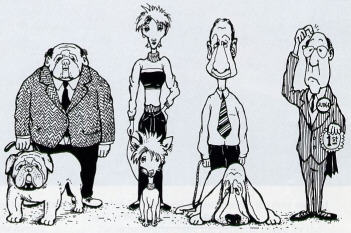
I thought I'd seen it all when it came to sales pitches and advertising gimmicks. That is, until I read the Philadelphia Inquirer one Sunday and came upon a piece of advertising genius more effective than the "bandwagon appeal" and more subtle than subliminal suggestion. "Human beings and their pet dogs frequently have an uncanny resemblance," asserted the author. "The Ralston Purina Co. has latched on to this idea to promote a new pet food, and is offering a prize of $10,000 for the dog and owner that most resemble each other."
At first this contest seemed to be just one more juicy worm designed to lure suckers into the net of consumerism. The combination of proffered money and a forum in which contestants can show off themselves and their pets will certainly be irresistible. It wasn't long, however, before I began to suspect that this promotion had a lot more going for it.
An incredible, far-fetched suspicion rose, unbidden, to the forefront of my mind: Is Purina betting on reincarnation? Could it be possible? Could Ralston Purina have made an astounding leap over the status quo of the advertising business and beyond the bounds of conventionality? Crazy? Perhaps, but it seems as if Ralston Purina has taken at face value one of the most well-known scriptures in the world, the Bhagavad-gita, and is applying it directly if perversely in degraded, twentieth-century America. You may think I'm nuts. But look how it makes sense.
According to my wild surmise, Purina is taking to heart the Bhagavad-gita's predictions concerning the long-term prospects of those who become totally immersed in their pets. No one can deny the affinity that many people feel for their dogs. Often a dog's master or mistress will not only allow the dog to eat off the same plate, but will dress his or her pet in designer sweaters as well. Indeed, pet and pet lover often do begin to spookily resemble each other. The Bhagavad-gita (15.8) comments as follows on the fate of someone who identifies so strongly with his or her pet:
sariram yad avapnoti
yac capy utkramatisvarah
grhitvaitani samyati
vayur gandhan ivasayat
"The living entity in the material world carries his different conceptions of life from one body to another as the air carries aromas. Thus he takes one kind of body and again quits it to take another." His Divine Grace A. C. Bhaktivedanta Swami Prabhupada, the founder-acarya of the International Society for Krishna Consciousness, further illuminates the uncomfortable future of such a person: "At the time of death, the consciousness that he has created will carry him on to the next type of body. If he has made his consciousness like that of a cat or dog, he is sure to change to a cat's or dog's body."
Ralston Purina appears to have accepted the Bhagavad-gita's assertion that the ardent pet-lover of today will most likely be the tail-wagging partaker of doggie treats and canine entrees tomorrow. As the Bhagavad-gita states, the consciousness of a person in this life definitely determines the type of body that person will take in the next. If people identify so strongly with a dog that they begin to resemble one, chances are these persons will, in their next birth, adopt a dog's body. Whether Ralston Purina is aware of it or not, this fact may well work to their advantage.
The contest creates loyal purchasers of Purina's dog food. And those purchasers who closely identify with their dogs today will find themselves on the other end of the leash tomorrow, and their previously formed brand-preference, carried over from their human existence, will naturally influence what their doting masters buy for them. Clearly, then, the Ralston Purina Company has made a sound investment in its long-term future and is likely to remain top dog in the pet-food business for many years to come.
